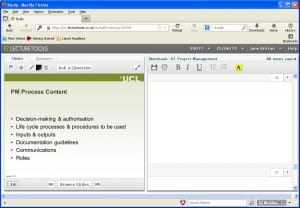Interactive lectures in Management Science & Innovation: A pilot evaluation study of LectureTools
By Vicki Dale, on 12 August 2013
Jane Britton and Matt Whyndham recently piloted LectureTools with a small group of 17 students in a short course in project management. LectureTools is a cloud-based electronic voting system which students and their teachers can access via their laptops or mobile devices. The system works by importing an existing PowerPoint presentation and then adding interactivity to it, through varied question formats. LectureTools allows students to take notes on their devices alongside each slide; they can also flag when they are confused about a particular slide, or submit questions, which will be displayed on the tutor ‘dashboard’ (see the screenshots below, click on each one to see a full size image).
LectureTools presenter interface (the ‘dashboard’), showing an activity slide at the top, student responses and comprehension on the right, and a panel displaying student questions on the middle left. A preview of the adjacent slides is shown at the bottom of the screen.
LectureTools student interface, showing the PowerPoint slides on the left with the interactive options above and the note-taking area on the right.
As E-Learning Evaluation Specialist within ELE, I carried out an evaluation, gathering data from a range of sources. These included an observation of one of Jane’s interactive lectures and a student questionnaire followed by a focus group discussion with a sample of participants. Both educators were also interviewed at the end of the course. Students rated the system positively overall for stimulating their engagement in the subject, allowing them to measure their understanding, fostering discussion in the classroom and facilitating easy note-taking. In addition, they perceived that it helped them prepare for their forthcoming examination. Student comments included:
“I liked the LectureTools a lot. I’m really impressed by it. It’s so easy to use and so helpful and most of us nowadays work on computers anyway during the lecture so it just makes it easier not to write everything in Word, copy the slides, we have everything on one screen.”
“We haven’t really asked a question to a lecturer but I think that’s great, that you can write a question and then the lecturer looks there and then they can answer it.”
Both Jane and Matt felt it was helpful to know what students were thinking and to be able to provide timely feedback, although having a class of students all staring at their laptops at various points was initially disconcerting:
“I think I notice that you get a lot of heads down working all of a sudden and it looks very disconcerting at first … you need to just be aware that they are working and they’re thinking about your stuff but they’re not looking at your face.”
One potential issue that came out of the observation and the survey of students was the opportunity for distraction; this generally happened when students had typed in their responses to open questions and were waiting for other students to ‘catch up’:
“I do think that the multiple choice questions, or putting the order questions, those are very good ones because all of us answered relatively quickly … so we had no time for distractions but the written ones … when you don’t have anything to do you start to do other things.”
Learning activities need to be carefully structured in order to give students enough time and opportunities to think about their topic, but not so much that they use the laptop to access resources not related to their studies. For this reason, the students and Jane and Matt considered that closed questions such as multiple choice questions might be better than open questions for large lectures.
A working paper of this study will shortly be uploaded to UCL Discovery.
E-Learning Environments is working with other staff in various departments around the university to explore the potential of LectureTools to facilitate interactive lectures. If you would like more information or would like to pilot LectureTools or a comparable electronic voting system, please contact myself or Janina Dewitz, our Innovations Officer.
 Close
Close



